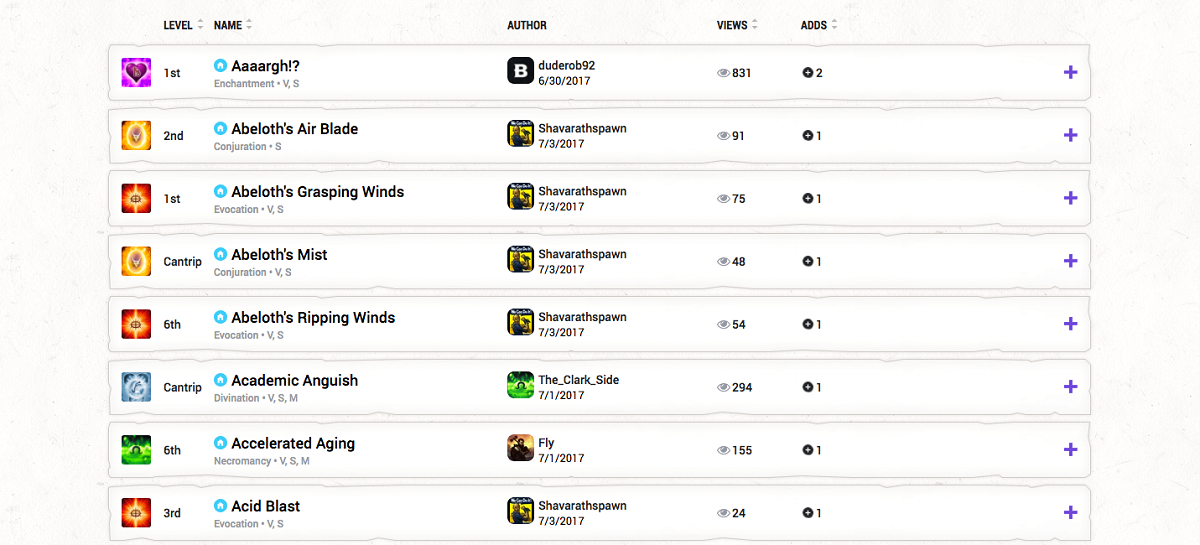Dungeons & Dragons has flirted with digital offerings over the years. But these have been static, closed off from interaction in a game that encourages players to tinker with just about every part it. This ends with D&D Beyond. In a beta test state at the moment, this online toolset will launch August 15, according to D&D publisher Wizards of the Coast.
The service, which will work on the web or on mobile, will include both free and paid content, which will unlock full products such as the Player’s Handbook, Dungeon Master’s Guide, and the Monster Manual along with supplements such as Volo’s Guide to Monsters or the upcoming Xanathar’s Guide to Everything. It will require a Twitch login to use as well.
This move further reflects Wizards of the Coast’s emphasis on providing players a way to experience and use tools for D&D online. You can play the RPG on sites such as Roll20 and Fantasy Grounds. It has a large presence on YouTube and Twitch thanks to shows such as Critical Role. D&D recently made its virtual reality debut in a chess app, and the game’s boss is even thinking about how D&D could work in augmented reality.
At launch, Beyond will have the following offerings:
- The free basic rules (nine races and 12 classes) for creating characters and running D&D games. Players will be able to use these and homebrew content without forking over a cent.
- Purchases of core rule books such as Player’s Handbook, Dungeon Master’s Guide, and the Monster Manual and supplements such as Volo’s Guide to Monsters. These will cost $30, and for the first seven days (August 15-August 21), the core books are $20 each.
- Adventure modules such as Curse of Strahd or Storm King’s Thunder are $25 each.
- Subscriptions tiers (Hero and Master) that unlock content.
- Homebrew content (that’s material that other players and Dungeon Masters make). You can share it, too.

Above: Abeloth? Who’s mixing Star Wars with my D&D!
GamesBeat asked Wizards of the Coast if it would offer a bundle package at retail in which if you buy a book, such as the Dungeon Master’s Guide, it would unlock the digital offering on D&D Beyond. Wizards did not have an answer as of press time, but D&D director Nathan Stewart did get an answer to us later this morning. [Update, 9:20 a.m. Pacific time]
“It is a great question and one that we’ve batted around on a number of different partnerships, but the solutions are complicated,” Stewart said. “A physical book with a digital code or unlock is unlikely in the near-term, but a Wizards/Curse bundle is in the works.”
This project isn’t merely taking a bunch of rules and bolting a few interactive do-hickeys into them. I asked Curse senior product manager Adam Bradford about the greatest challenge of D&D Beyond. He quipped “Warlocks” at first, but he then settled into how the tabletop RPG differs from digital and video games.
“The biggest challenge for us is the challenge inherent in bringing anything like Dungeons & Dragons into a digital format. It’s an analog game. It’s not built with restrictions you have to have for video games — doesn’t matter what a video game says about being an open world. [The Elder Scrolls V:] Skyrim is still limited. You won’t be able to walk past the edge of the map. You’re not going to be able to flirt with an NPC without it having dialogue options put in front of you,” he said. “Ultimately, Dungeons & Dragons is completely wide open. That ruleset is built in a way that allows that openness to be a possibility. So taking that ruleset and putting it into a digital format, especially a relational database where all of these elements can talk to one another … that has been a real challenge.”
He then used the Warlock as an example. It’s unlike traditional spellcasters such as the Wizard and Cleric.
“It has such different rules than other classes in the game. Those kind of situations and exceptions that keep popping up are great at the table, but are a little more challenging for use to work with on our side,” Bradford said. If you multiclass, you have to deal with how mages cast spells and the pact-magic of the Warlock (who get their spells from otherworldly patrons, not a god or studying spellbooks) … all with the same character.
“We ran into a really, really interesting issue, and it’s really from a data perspective, not incredibly difficult for us, but from a UI perspective, it’s been a challenge to figure out how to present that information to the player in a way that they can use it easily,” Bradford said. “That’s been the toughest part. We’ve had to spend a lot of extra time doing that, but I think it’s time well spent.”
And some of the functions that feel like bugs aren’t. I created a Tiefling Wizard, and I was able to add far more spells than I was capable of learning at first level. Part of it was testing how the UI worked in the builder and are finishing ahead of launch, but Bradford says it works like this for a reason so that DMs and players can create the campaigns and worlds they want to play in.
A DM can audit this with campaign management. They could send a campaign link to their players, and the DM could view their characters in the builder or the sheet. “Oh, Sally, you can’t have 10 spells at first level,” Bradford offered as an example. But some DMs can say within the rules that “You grew up in a library and in fact have all of those in first level.”
D&D Beyond is a partnership between Wizards of the Coast and Curse, which Twitch acquired last year. Curse provides voice client, database, and other tools for gaming.

